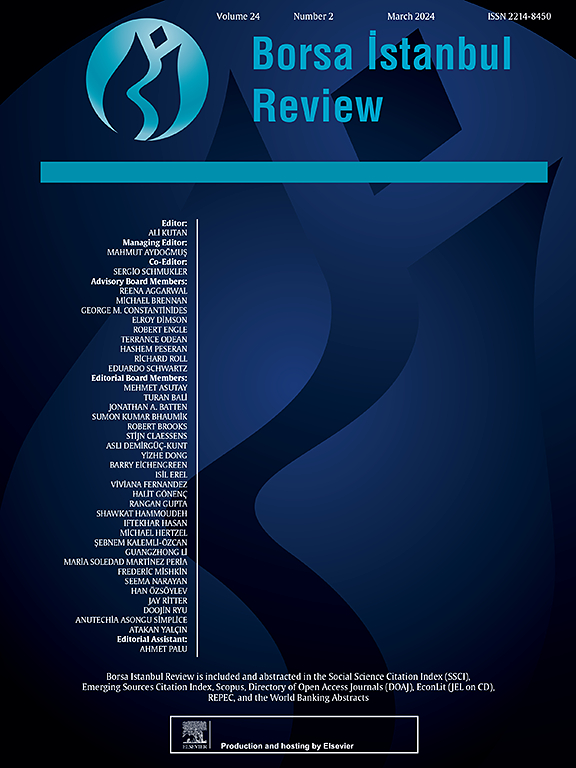贸易政策不确定性与海湾合作委员会伊斯兰股票部门波动性之间基于量子的扩展联合关联性
IF 6.3
2区 经济学
Q1 BUSINESS, FINANCE
引用次数: 0
摘要
本研究量化了海湾合作委员会(GCC)国家贸易政策不确定性(TPU)指数与符合伊斯兰教法的股票行业条件波动性之间的冲击传导机制。我们采用了包括时域扩展联合和频域量子向量自回归(QVAR)框架在内的综合分析方法。时域量子向量自回归分析表明,TPU 对公用事业部门的波动性造成的冲击最大。海湾合作委员会的投资者必须战略性地将其投资组合分配到消费服务和能源行业,这些行业受 TPU 冲击的影响较小。研究结果表明,TPU 冲击为公用事业、房地产投资信托基金(REIT)、医疗保健和工业行业的长期和看涨条件波动率(或较高的量化值)提供了更多的误差方差。相反,在看跌的波动率条件下(较低的量化值),TPU 冲击会导致公用事业、房地产投资信托基金、金融和工业部门的条件波动率受到较大冲击。长期投资者应分散投资组合,通过对消费服务行业的战略投资来降低公用事业、房地产投资信托和工业行业的风险。然而,从短期来看,无论是在看跌还是看涨的行业波动中,消费服务和工业行业都更容易受到 TPU 的冲击。在多样性方面,房地产投资信托、能源和金融行业受 TPU 冲击的影响最小,在短期内以及海湾合作委员会伊斯兰行业波动较大和波动较小的时期都能提供保护性缓冲。本文章由计算机程序翻译,如有差异,请以英文原文为准。
Quantile-based extended joint connectedness between trade policy uncertainty and GCC Islamic stock sectoral volatility
This study quantifies the shock transmission mechanism between the trade policy uncertainty (TPU) index and Sharia-compliant stock sectoral conditional volatility in the Gulf Cooperation Council (GCC) countries. We employ a comprehensive analysis that includes the time-domain extended joint and frequency-domain quantum vector autoregressive (QVAR) frameworks. The time-domain QVAR demonstrates that TPU causes the most substantial shocks to utility sector volatility. Investors in the GCC must strategically allocate their investment portfolios to the consumer services and energy industries, which are less vulnerable to the TPU shock. The results show that TPU shocks provide more error variances to the long-term and bullish conditional volatility (or higher quantiles) of the utility, real estate investment trust funds (REIT), healthcare, and industry sectors. Conversely, during bearish volatility conditions (lower quantiles), TPU shocks result in higher shocks in the conditional volatility of the utility, REIT, finance, and industrial sectors. Long-term investors should diversify their portfolios to mitigate risk in the utility, REIT, and industry sectors through strategic investments in consumer service sector. However, in the short term and during both bearish and bullish sectoral volatility, the consumer service and industry sectors are more vulnerable to TPU shocks. Regarding diversity, the REIT, energy, and financial sectors are the least affected by TPU shocks, offering a protective buffer in the short term and during periods of higher and lower GCC Islamic sectoral volatility.
求助全文
通过发布文献求助,成功后即可免费获取论文全文。
去求助
来源期刊

Borsa Istanbul Review
Multiple-
CiteScore
7.60
自引率
3.80%
发文量
130
审稿时长
26 days
期刊介绍:
Peer Review under the responsibility of Borsa İstanbul Anonim Sirketi. Borsa İstanbul Review provides a scholarly platform for empirical financial studies including but not limited to financial markets and institutions, financial economics, investor behavior, financial centers and market structures, corporate finance, recent economic and financial trends. Micro and macro data applications and comparative studies are welcome. Country coverage includes advanced, emerging and developing economies. In particular, we would like to publish empirical papers with significant policy implications and encourage submissions in the following areas: Research Topics: • Investments and Portfolio Management • Behavioral Finance • Financial Markets and Institutions • Market Microstructure • Islamic Finance • Financial Risk Management • Valuation • Capital Markets Governance • Financial Regulations
 求助内容:
求助内容: 应助结果提醒方式:
应助结果提醒方式:


